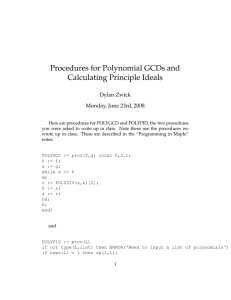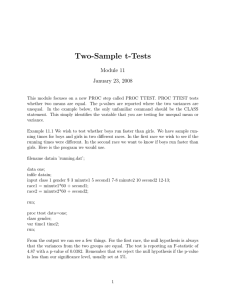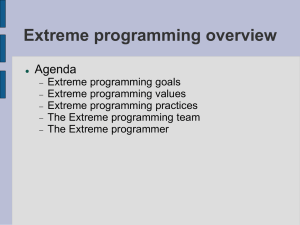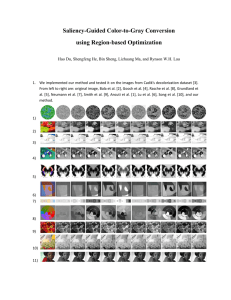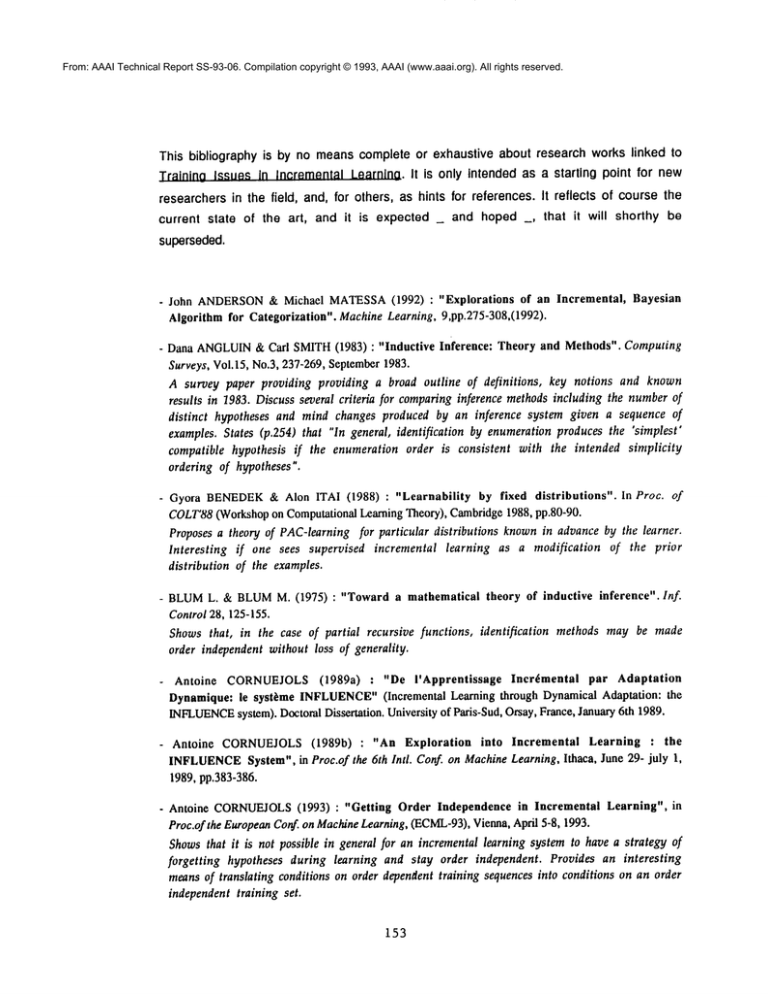
From: AAAI Technical Report SS-93-06. Compilation copyright © 1993, AAAI (www.aaai.org). All rights reserved.
This bibliography is by no meanscomplete or exhaustive about research works linked to
Training Issues In Incremental Learning. It is only Intended as a starting point for new
researchersin the field, and, for others, as hints for references. It reflects of course the
current state of the art,
and it
is expected _ and hoped _, that it
will
shorthy be
superseded.
- John ANDERSON
& Michael MATESSA
(1992) : "Explorations of aa Incremental,
Algorithm for Categorization". MachineLearning, 9,pp.275-308,(1992).
- Dana ANGLUIN
& Carl SMITH(1983) : "Inductive
Surveys, Vol.15, No.3, 237-269, September1983.
Inference:
Bayesian
Theory and Methods". Computing
A survey paper providing providing a broad outline of definitions,
key notions and known
results in 1983. Discuss several criteria for comparinginference methods including the numberof
distinct hypotheses and mind changes produced by an inference system given a sequence of
examples. States (p.254) that "In general, identification by enumeration produces the ’simplest"
compatible hypothesis if the enumeration order is consistent with the intended simplicity
ordering of hypotheses".
- Gyora BENEDEK
& Alon ITAI (1988) : "Learnability
by fixed distributions".
In Proc. of
COLT’88(Workshopon ComputationalLearning Theory), Cambridge1988, pp.80-90.
Proposes a theory of PAC-learningfor particular distributions knownin advance by the learner.
Interesting if one sees supervised incremental learning as a modification of the prior
distribution of the examples.
- BLUML. & BLUM
M. (1975) : "Toward a mathematical theory of inductive inference". Inf.
Control28, 125-155.
Shows that, in the case of partial recursive functions, identification methods may be made
order independent without los5 of generality.
Antoine CORNUEJOLS(1989a) : "De I’Apprentissage
Incr6mental
par Adaptation
Dynamique: ie syst~me INFLUENCE"
(Incremental Learning through Dynamical Adaptation: the
INFLUENCE
system). Doctoral Dissertation. University of Paris-Sud, Orsay, France, January 6th 1989.
Antoine CORNUEJOLS
(1989b) : "An Exploration
into Incremental
Learning : the
INFLUENCE
System", in Proc.of the 6th Intl. Conf. on MachineLearning, Ithaca, June 29- july 1,
1989, pp.383-386.
- Antoine CORNUEJOLS
(1993) : "Getting Order Independence in Incremental Learning",
Proc.of the EuropeanConf. on MachineLearning, (ECML-93),
Vienna, April 5-8, 1993.
in
Shows that it is not possible in general for an incremental learning system to have a strategy of
forgetting hypotheses during learning and stay order independent. Provides an interesting
means of translating conditions on order dependent training sequences into conditions on an order
independent training set.
153
- Robert DALEY
& Carl SMITH(1986) : "On the Complexity of Inductive Inference". Information
and Control, 69, pp.12-40, 1986.
Introduces an axiomatization of the concept of the complexity of inductive inference based on
the total resources used by an inference strategy in the process of converging to a correct
inference. (distinguihes it from other measures such as the number of distinct hypotheses made
by the inference system or the number of mind change in the course of inferencing). Gives some
examples of the effect of changingthe order of presentation on the complexity of inference.
(1987) : "Non-cumulative learning in METAXA.3".
Proc. of the International
- WemerEMDE
Conference
on Artificial Intelligence (IJCAI-87), Milano,1987, pp.208-210.
- Douglas FISHER(1987) : "Knowledge Acquisition
MachineLearning, 2, pp.139-172,1987.
Joint
Via Incremental Conceptual Clustering",
and an Order-Independent
- FISHER, XU & ZARD(1992) : "Ordering Effects in COBWEB
Method".To appear in Proe. of the 9th Int. Conf. on MachineLearning, Aberdeen, june 29-july 1st,
1992.
- Sally FLOYD(1989) : "Space-Bounded Learning and the Vapnik-Chervonenkis Dimension".
In Proc. of COLT-89,349-364.
& FISHER (1989)
- GENNARI, LANGLEY
Artificial lnteligence, 40, 1989,pp.11-61.
: "Models of Incremental
Concept Formation".
- Sally GOLDMAN
& Michael KEARNS
(1991) : "On the Complexity of Teaching".
COLT’91,Santa Cruz, Aug. 5-7 1991, pp.303-314.
Proc. of
Defines a Teaching Dimension (the minimum number of examples a techer must reveal to
uniquely identify any concept in the class of concepts). Prove that finding an optimal teaching
sequence is NP-hard. Give optimal teaching sequences for some classes of concepts.
& David YUN(1989) : "Concept Formation by Incremental
- Mirsad HADZIKADIC
Clustering", Proc. of the IJCAI-89, pp.831-836.
Conceptual
HAUSSLER, KEARNS& SCHAPIRE (1991) : "Bounds on the Sample Complexity
Bayesian Learning Using Information Theory and the VC Dimension". Proc. of COLT’91,
Santa Cruz, Aug.5-7 1991, pp.61-74.
- HELMBOLD
David & LONGPhilip (1991) : "Tracking Drifting Concepts Using Random
Examples".Proc. of COLT’91,Santa Cruz, Aug. 5-7 1991, pp.13-23.
Related to rate effects. Whatis the optimal rate with which to follow a drifting concept?
- HELMBOLD,
SLOAN& WARMUTH
(1989) : "Learning Nested Differences
Closed Concept Classes". In Proc. of COLT-89,41-56.
of Intersection-
- HaymHIRSH(1990) : "Incremental Version-Space Merging". Proc. of the 7th Int.
MachineLearning. Univ. of Austin, Texas, June 21-23, 1990, pp.330-338.
154
Conf. on
- Haim HIRSH(1989) Incremental ve rsion-space me rging : a general fr amework for concept
learning.Doctoraldissertation, Stanford, june 1989.
Says on p. 65 that "the general problem of determining a subset of training data that yields
optimal learning id NP-hard°’ (!?). Provides an heuristic for an optimal ordrering of the
training examples.
- James MacGREGOR
(1988) : "The Effects of Order on Learning Classifications by Example:
Heuristics for Finding the Optimal Order", Artificial Intelligence, vol.34, pp.361-370, 1988.
- IBA, WOGULIS
& LANGLEY
(1988) : "Trading off simplicity and coverage in incremental
conceptlearning". Proc. Of the 5th Intl. Conf. on MachineLearning, pp.73-79, AnnArbor, Michigan,
1988. MorganKauffmann.
- Klaus JANTKE
(1990) "M
onotonic and non-monotonic Inductive Inference". Pr oc. of the firs t
Int. workshopon AlgorithmicLearningTheory(ALT’90),Tokyo, October8-10,1990, pp.269-281.
GENNARI
& IBA (1987) : "Hill-Climbing Theories of Learning". In Proc. of the 4th
- LANGLEY,
Int. Workshop
on MachineLearning,Univ. of Calif., Irvine, June 22-25, 1987, pp.312-323.
Describes the CLASSIT and MAGGIEsystems, both incremental
hypothesis at a time without memoryof previous states.
and maintaining
only one
- Xiaofeng (Charles) LING(1991) : "Inductive Learning from GoodExamples". In Proc. of the
Int. Joint Conf.on Artif. Intel. (IJCAI-91),pp.751-756.
Studies what kind od data may ease the computational complexity of learning of Horn clause
theories and boolean functions.
Wolfgang MAASS(1991) "On-line Le arning wi th an Oblivious Env ironment and the
Powerof Randomization". Proc. of COLT’91,Santa Cruz, Aug. 5-7 1991, pp.167-175.
- Wolfgang MAASS& Gy0rgy TURAN(1992) : "Lower Bound Methods and Separation
for On-LineLearningModels". MachineLearning, 9, pp.107-145, 1992.
Tom MITCHELL(1978) Version Sp aces : AnApproach to Concept Lea rning.
Dissertation, Stanford University, december1978, STAN-CS-78-711)IPP-79-2.
- TomMITCHELL
(1982) : "Generalization as Search", Artificial
1982.
Intelligence,
Results
Ph. D.
vol.18, pp.203-226,
- Jordan B. POLLACK
(1991) : "The Induction of Dynamical Recognizers". Machine Learning, 7,
pp.227-252, 1991.
$tudies learning networks from the perspective of dynamical systems.
- Sara PORAT& Jerome A. FELDMAN
(1991) "Learning Au tomata fr om Ordered Ex amples".
MachineLearning,7, pp. 109-138,1991.
This paper presents a provably correct algorithm for inferring any minimum-state deterministic
finite-state
automata (FSA) from a complete ordered sample using limited total storage and
155
without storing examples strings. It also shows that no machinewith finite working storage can
iteratively identify the finite-state language (FSL) from arbitrary presentations.
- Anand RAO& Norman FOO(1989) : "Minimal Change and Maximal Coherence: A Basis for
Belief Revision and Reasoning about Actions". Proc. of IJCAI-89, 966-971.
- REINKE& MICHALSKI
(1986) : "Incremental Learning of Concept Description : A Method
and Experimental Results". In J.E. Hayes (Ed.), MachineLearning, 11, Oxford University Press,
1986.
- Ronald RIVEST& Robert SLOAN(1988) : "Learning Complicated Concepts Reliably and
Usefully". In Proc. of COLT’88(Workshopon Computational Learning Theory), Cambridge 1988,
pp.69-79.
Proposes to help the learner by having learn first sub-concepts of the concept to be learned. And
defines a variation of the Valiant model by introducing the notions of reliable and useful
learning.
- J. SCHLIMMER
& D. FISHER (1986):
AAAI-86,1986, pp.496-501.
"A Case Study of Incremental
& R. GRANGER
(1986) : "Incremental
- J. SCHLIMMER
Learning, pp.317-354,1986.
Learning from Noisy Data". Machine
- J. SCHLIMMER
& R. GRANGER
(1986) : "Beyond incremental
drift". Proc. of the AAAI-86,pp.502-507,1986.
- SEUNG& SOMPOLINSKY
& TISHBY(1991) : "Learning
Proc. of COLT’91,Santa Cruz, Aug.5-7 1991, pp.113-127.
Concept Induction".
processing:
Tracking concept
Curves in Large Neural Networks".
- Benjamin SMITH& Paul ROSENBLOOM
(1990) : "Incremental Non-Backtracking Focusing:
polynomially Bounded Genenralization
Algorithm for Version Spaces". In Proc. of the
AAAI-90, pp.848-853.
- Ayumi SHINOHARA
& Satoru MIYANO
(1990) : "Teachability in Computational Learning",
Proc. of the Workshopon AlgorithmicLearning Theory, 1990, pp.247-255.
Establishes a relationship between the notions of teachability and learnability.
Devika SUBRAMANIAN
& Joan FEIGENBAUM
(1986)
Generation". In Proc. of the AAAI-86,pp.518-522.
: "Factorization
in Experiment
Proposes to speed learning in the Version Space scheme by exploiting independence properties
and factoring the Version Space.
- Paul UTGOFF
(1988) : "ID$ : An Incremental ID3". In Proc. of the 5th Intl.
Learning, AnnArbor, june 12-14, 1988, pp.107-120.
Conf. on Machine
(1989) : "Incremental Induction of Decision Trees". Machine Learning, 4, pp.161- Paul UTGOFF
186, 1989.
156
- Van de Veldc W. (1989) : "IDL, or Taming the Multiplexer".
France, 4-6 december1989, pp.211-226.
Proc. of EWSL-89, Montpellier,
- C. Vrain & C. Lu (1988) : "An Analogical method to do incremental learning of concepts".
Proc. of the EWSL-88,Glasgow,1988.
- Kurt Van LEHN(1987) : "Learning one subprocedure per lesson". Artificial
pp.l-40, january 1987.
Intelligence,
31 (1),
- Widmer G. (1989) : "An Incremental Version of Bergadano & Giordana’s Integrated
Learning Strategy". Proc. of EWSL-89,Montpellier, France, 4-6 december1989, pp.227-236.
P.H. (1970) : "Learning structural descriptions
- WINSTON
Artificial Intelligence Laboratory,Cambridge,MA,1970.
157
from examples", AI-TR-231, MIT,

